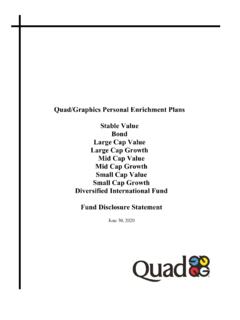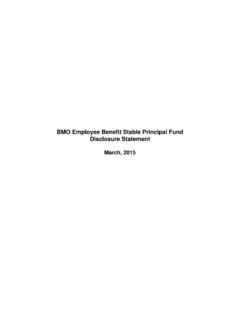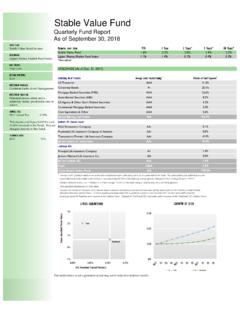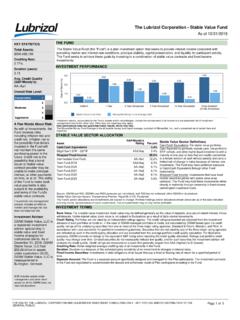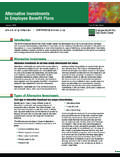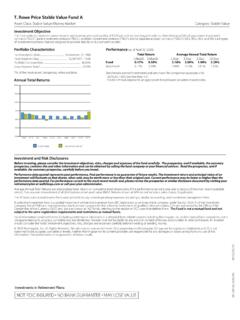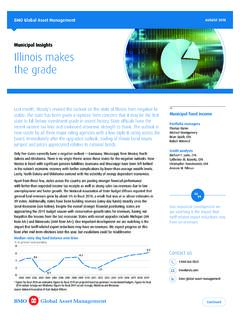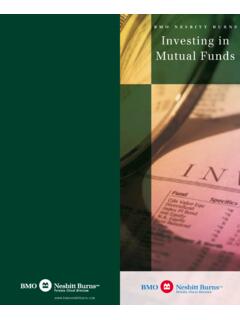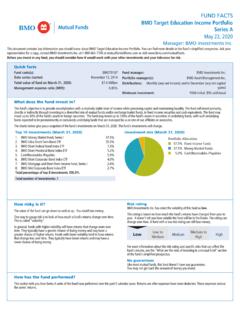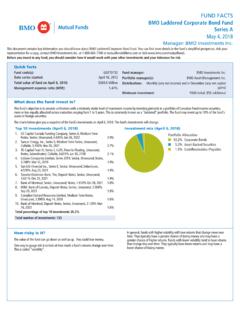Transcription of Ask Frequently Asked Questions - Morley
1 Frequently Asked QuestionsWhat is stable value ? stable value is an asset class that is typically designed to provide capital preservation and relatively stable returns consistent with its comparatively low risk profi le, and liquidity for benefi t-responsive payments. Most investment managers of stable value funds strive to provide a high credit quality, well-diversifi ed portfolio. When comparing stable value to other investment options, although past performance is not an indicator of future results, you may fi nd that historically the stable value asset class has provided returns that, over a full market cycle, have been similar to short term bond funds. However, stable value seeks to provide price stability which a bond fund does not typically enjoy. For a more detailed look into stable value funds and how they work, please refer to our video presentation located in the Knowledge section of our website Ask MorleyWe ve answered some of your most common Questions about stable value .
2 Who can invest in stable value ? stable value funds are only available within an employer-sponsored deferred compensation or retirement savings plan. stable value has been a staple of many plans since the late 1970 s. Plan types include, but are not limited to: 401(k), profi t sharing, money purchase and Governmental 457 plans. It is important to note that stable value funds cannot accept investments directly from individuals. This means that while individuals may select a stable value fund as an investment option through various retirement plans they cannot invest in a stable value fund directly through an investment broker or are some of the potential benefi ts of investing in stable value ? A typical stable value fund s objective is not only to preserve capital, but also to provide a positive rate of return with limited fl uctuation relative to other investment options.
3 Capital preservation means investors should expect to maintain 100% of their initial is a wrap? stable value is one of the few asset classes in retirement plans that are designed to provide plan participants the ability to transact at book value , which means the value of an investment plus earned interest minus withdrawals. The ability for participants to transact at book value is accomplished by the use of stable value investment contracts, also referred to as wrap contracts or investment contracts. These are contracts issued by insurance companies, banks, and other fi nancial institutions that provide book value accounting treatment. Investment contracts do not insure the value of a fund and are not insurance against fund losses but rather by applying book value accounting standards permit the amortization of gains and losses over time through the crediting rate, thus providing capital preservation.
4 TreasuriesAgenciesAsset BackedCorporate Bonds+Bond portfolio (MV)Wrap contract (BV) stable value fundTreasuriesAgenciesAsset BackedCorporate BondsMortgagesMortgagesAsk MorleyWhat does book value represent?Accounting practices allow for stable value investments to be held at book value , which is generally representative of the principal invested in each contract and any earnings, as credited to the investment vehicle, based upon a contractually negotiated crediting rate. Book value performance is generally illustrative of participants performance, earnings and potential liquidation value and is not subject to market fl uctuations. Additionally, the accounting methodology allows a fund to amortize market value gains and losses over time through the fund s crediting rate thus providing capital is the crediting rate determined?
5 The rate of return credited to the book value of a stable value fund , expressed as an annual percentage rate is calculated based on a book value dollar weighted basis gross of the Trustee/Adviser, Recordkeeping Off set and Other Expenses but net of Wrap Fees, Sub-Adviser Fees, and Acquired fund Fees. A crediting rate is determined per investment contract which may remain fi xed for the term of the contract or may be reset at predetermined intervals based upon portfolio characteristics including yields, market value , book value and duration. The data is provided for general informational purposes and the return received may be higher or lower than the crediting rate provided. A typical formula for determining a crediting rate on a wrap contract is shown below. Rates on wrap contracts in Morley products are generally calculated on a monthly basis and used in the determination of the fund s daily crediting rate.
6 2 What does market value represent? Market value is the cumulative value of securities consistent with a valuation standard and calculation methodology. Many of the securities underlying investment or wrap contracts are publicly traded and valued by third party public pricing sources. Other stable value contract types are not publicly traded and are fair valued based on internal standards and regulatory guidance. Investments in certain pooled investment vehicles, including stable value collective investment trusts (CITs) may be valued at book value even if the market value of the CIT is below book value based upon the principal and liquidity protection structure of such investments. The type of securities being valued, general market conditions and the valuation process may all infl uence the fi nal market value determinations and the corresponding performance information.
7 Market value and corresponding market valued returns are typically provided for informational purposes does the Market value /Book value (MV/BV) ratio represent? MV/BV, or market to book value ratio, represents a measurement of the market value of a stable value fund s underlying securities as compared to its book value ; typically quoted as a percentage. Generally, participant transactions occur at book value even if the market value is above or below the book CR = (1+Y) * (Market value /Book value ) ^ (1/D) -1 - FRepresents the yield of underlying fixed income shows whether the portfo-lio has a gain or loss based on current value of securities. A gain (MV>BV) increases the yield credited while a loss (MV<BV) lowers it over the yield of underlying fixed income MorleyWhat is an insurance company Separate Account Contract?
8 A Separate Account Contract is an investment contract that is backed by the assets of an insurance company s separate account rather than its general account. The interest rate on a separate account resets periodically based upon the earnings of the separate account assets. The securities held in the separate account are owned by the insurance company, but are held for the exclusive benefi t of the plan or plans participating in the separate account. These plans are policyholders of the insurance company where any guarantees on Separate Account Contracts are also supported by the insurer s general account assets and is a Guaranteed Investment Contract (GIC)?Guaranteed Investment Contracts, (also known as Guaranteed Insurance Contracts or Guaranteed Interest Contracts) are typically issued by insurance companies and off er a specifi ed rate of return for a specifi c period of time.
9 Such contracts are backed by the claims paying ability of the issuing is a pooled fund ? Collective Investment Trusts (CITs) also known as pooled funds are comingled investment accounts, for which multiple clients may invest in the same pooled fund . CITs are exempt from registration with the Securities and Exchange Commission as an investment company under Section 3(c)11 of the Investment Company Act. CITs are maintained by banks or trust companies which are regulated by federal regulatory agencies including the Offi ce of the Comptroller of the Currency (OCC) and/or state banking & trust agencies. CITs are designed exclusively for certain qualifi ed pension, profi t sharing, and government plans including 401(k) plans, governmental 457(b) plans, and Taft-Hartley is an insurance company General Account Contract?
10 A General Account Contract is an investment contract that is backed by the general account of an insurance company. The insurer pledges principal protection and participant benefi t payments at book value . Interest rates on these types of contracts reset periodically at the discretion of the insurance company. The securities held in the general account are owned by the insurance company. Such contracts are backed by the claims paying ability of the issuing does the average credit quality represent? Average credit quality represents an average of the market value dollar weighted credit quality of the underlying securities in a fund as obtained by applicable credit rating agencies. Morley s funds are not rated by these agencies. Average credit quality calculation methodologies may vary across the industry which may impact the validity of should be understood about duration?
